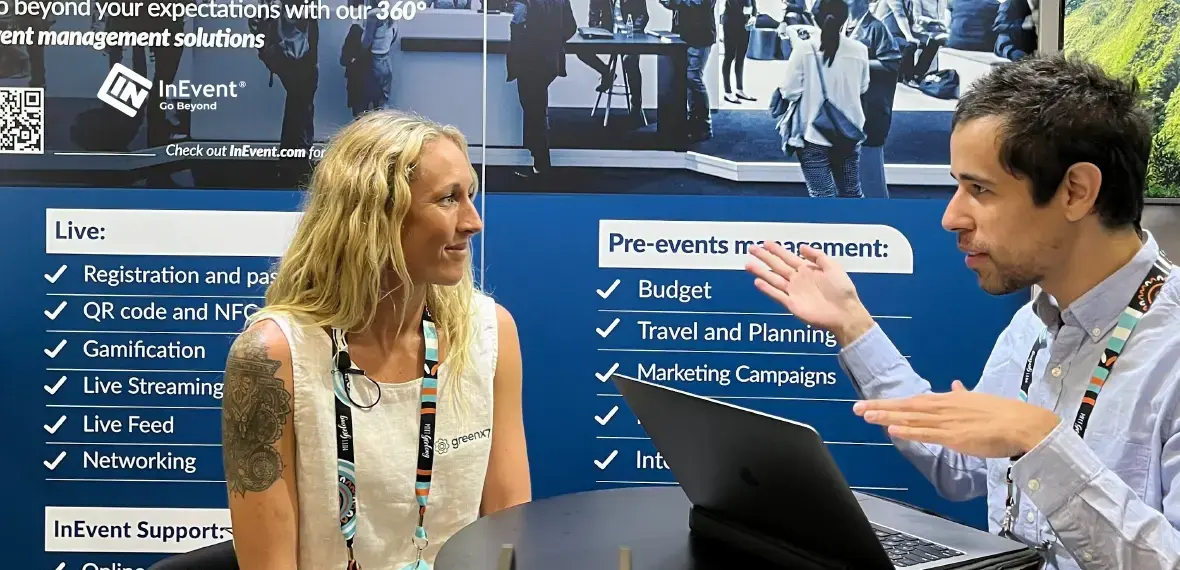Posted on December 5, 2023
When it comes to sourcing services or products, whether in general business, government procurement, or specifically in event planning, understanding and creating a Request for Proposal (RFP) is crucial. An RFP is more than just a document; it’s a strategic tool used in making informed decisions. It outlines the needs of an organization and asks potential suppliers or service providers to propose solutions and bid for the job. Sometimes it’s a complicated process and that’s why we’ve made a tested RFP template so you can find a perfect event management partner for your event.
Understanding RFP for Events

Unlike a Request for Information (RFI) that seeks general information or a Request for Quotation (RFQ) that asks for price quotes, an RFP is more comprehensive. It not only asks for pricing but also detailed information on how the vendor intends to meet the project’s requirements, their experience, and their approach to the project.
A well-structured Request for Proposal (RFP) is composed of several critical elements that provide clarity and direction for potential vendors. These components ensure that organizations receive relevant and comparable proposals. The key components of an RFP include:
Introduction and Background: This section provides an overview of the organization issuing the RFP and the context or background of the project. It helps vendors understand the broader scope and purpose of the request.
Project Overview and Objectives: Here, the specific goals and expected outcomes of the project are outlined. This part should clearly convey what the organization hopes to achieve through the project.
Scope of Work (SOW): Possibly the most crucial section, the SOW details the specific tasks, deliverables, and timelines expected from the vendor. It includes technical requirements, project milestones, and performance metrics.
Submission Guidelines: This part specifies how and when proposals should be submitted. It includes deadlines, format requirements, and any necessary forms or documents that need to accompany the proposal.
Budget and Pricing: The RFP should outline the budget and pricing constraints and ask vendors to provide detailed pricing information, including any assumptions or conditions their pricing is based on.
Evaluation Criteria: Clearly stating how proposals will be evaluated helps vendors focus their responses on what is most important. Criteria can include cost, vendor experience, proposed solution, and compliance with the RFP requirements.
Terms and Conditions: This section covers legal and contractual aspects, including payment terms, confidentiality agreements, and contract length.
Point of Contact: Providing a specific point of contact for questions or clarifications is essential. This ensures consistent communication and helps vendors get accurate information.
For event planners, these components might also include details specific to events, such as venue requirements, attendee demographics, and special service needs like Housing Management or catering.
Event RFP Template for Event Planners
Creating an effective Event Request for Proposal (RFP) is crucial for outlining your event needs and attracting the right service providers. For event planners, starting from scratch each time can be daunting. A well-structured template not only saves time but also ensures you don’t miss essential details. Begin crafting your RFP with InEvent’s Free event RFP tool.
When drafting an Event RFP document, it’s essential to structure it in a way that guides vendors through your specific needs and expectations. Here are the key sections to include:
Project Overview:
Provide a brief description of the event including its purpose, target audience, and desired outcomes.
Example: “Our annual leadership summit aims to gather 200 industry leaders to discuss future trends in technology.”
Business Requirements:
Detail the logistical and business objectives of the event. Specify the type of event and the overarching goals.
Example: “The event will be a three-day conference with keynote speeches, breakout sessions, and networking events designed to foster innovation and collaboration.”
Event Management Needs:
Outline specific services required for effective event management. This might include registration processes, attendee management, and on-site coordination.
Example: “We require a full-service event management team to handle venue setup, guest registration, and real-time coordination of sessions.”
In-Person Event Specifications:
For the in-person event, outline the specific needs for the onsite execution, which may include:
- Event Map: A detailed layout of event map for clear navigation, showing session rooms, registration areas, and dining locations.
- Badges: Requirements for creating and distributing attendee badges, including name, affiliation, and access level information.
- Onsite Registration: Specifications for the registration area, including digital check-in processes and staffing needs to ensure efficient attendee management.
- Onsite Networking: Facilities and mobile app setups to facilitate attendee interaction, such as designated zones with seating and refreshments.
- Event Photos Management: Expectations for professional photography covering key moments and general ambiance, including event photos management.
Post-Event Services:
Define what services are needed after the event, such as data collection, feedback surveys, and event performance analysis.
Example: “Post-event, we need detailed attendee feedback analysis and a comprehensive report on session engagement to measure ROI.”
Commercial Requirements:
Specify the financial and contractual expectations for the event, including:
Example: Detail the pricing strategy, Invoicing procedure, terms and conditions, and other vendor agreements.
There can be other requirements according to the business and event needs. By clearly detailing all the sections in your RFP, you provide potential vendors with a comprehensive understanding of what is required, enabling them to propose the most accurate and relevant solutions.
Executing the RFP Process
Once your Event RFP is meticulously crafted, the next crucial steps involve:
Issuing the RFP: The RFP is then released to potential vendors. This can be done through public announcements, directly contacting selected vendors, or using platforms that connect buyers and suppliers.
Response Period: Vendors prepare and submit their proposals within the given timeframe. They may ask questions or seek clarifications during this period.
Proposal Evaluation: After the submission deadline, the organization reviews all proposals based on the pre-defined evaluation criteria. This might involve a committee and can include scoring systems for objectivity.
Vendor Selection: The organization selects the most suitable vendor(s) based on the evaluation. This step might include negotiations or further discussions to finalize the agreement.
Notification: All vendors, whether selected or not, are informed about the decision. Feedback may be provided to non-selected vendors.
Contracting: A contract is drawn up and signed with the selected vendor, formalizing the terms of the project.
Project Commencement: The project begins as per the agreed terms in the contract.
Common Challenges and Solutions in the RFP Process

Navigating the RFP process can present various challenges, both for the issuing organization and responding vendors. Here are some common issues and effective solutions:
Vague Requirements:
Challenge: Vague or unclear requirements in an RFP can lead to irrelevant proposals.
Solution: Ensure the RFP is detailed and specific, particularly in the Scope of Work. Clear, concise language helps avoid misunderstandings.
Overly Complex Proposals:
Challenge: Vendors may submit overly complex or technical proposals that are difficult to evaluate.
Solution: Specify in the RFP that proposals should be straightforward and easy to understand. Include a requirement for an executive summary or a simplified overview of the proposal.
Limited Vendor Response:
Challenge: Sometimes, RFPs attract a limited number of responses, reducing options.
Solution: Make sure the RFP is widely distributed and consider reaching out to potential vendors directly. Ensure the RFP is not overly restrictive or biased towards certain vendors.
Time-Consuming Evaluation Process:
Challenge: Evaluating proposals can be time-consuming and resource-intensive.
Solution: Streamline the evaluation process with a scoring system or a set evaluation committee. Establish clear evaluation criteria in the RFP.
Budget Constraints:
Challenge: Receiving proposals that exceed budget constraints is common.
Solution: Clearly state the budget in the RFP. Encourage vendors to provide best and final offers within the given budget.
For Event Planners:
Specific Challenges: Event planning RFPs may encounter issues like vendors not fully understanding event-specific needs or last-minute changes.
Solutions: Include detailed event-related questions in the RFP to assess vendors’ understanding and flexibility. Ask for examples of how they’ve handled changes or challenges in past events.
Ready to Find the Perfect Event Partner?
Crafting and executing an effective Event RFP can set the foundation for a successful event. By carefully preparing your RFP and managing the process with precision, you position your event to achieve its objectives and create memorable experiences for all participants.
If you want to ensure your RFP stands out and attracts the best vendors, consider booking a consultation with InEvent. Our experts are equipped to help you refine your RFP strategy and enhance your overall event success.
Are you done crafting and ready to Submit your RFP to find the perfect event technology partner? Click Below




